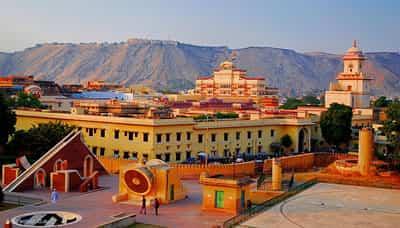Planning an Eco-Friendly Tour of Rajasthan
Planning an Eco-Friendly Tour of Rajasthan
If you are a nature lover and are passionate about preserving the environment, planning an eco-friendly tour of Rajasthan is a great idea. Known for its rich culture, magnificent palaces, and vibrant festivals, Rajasthan is also home to diverse flora and fauna, making it a perfect destination for eco-friendly travelers.
Why Choose Eco-Tourism in Rajasthan?
Eco-tourism focuses on promoting responsible travel practices that minimize the negative impact on the environment and support local communities. By choosing an eco-friendly tour in Rajasthan, you can contribute to the conservation efforts in the region and help to preserve the natural beauty and biodiversity for future generations.
Here are some reasons why you should opt for an eco-tourism experience in Rajasthan:
- Rajasthan is home to several national parks and wildlife sanctuaries, offering opportunities for wildlife spotting and birdwatching.
- Eco-tourism initiatives in Rajasthan help to protect endangered species such as tigers, elephants, and Indian rhinoceros.
- You can engage in sustainable practices like staying in eco-lodges or camps that are designed to have minimal impact on the environment.
- By supporting local communities and buying locally made products, you contribute to the economic development of the region.
- Exploring the rural areas of Rajasthan allows you to witness the traditional way of life and learn about the customs and traditions of the local communities.
Planning Your Eco-Friendly Tour
When planning your eco-friendly tour of Rajasthan, here are some important considerations:
Choose Nature-Focused Destinations
Start by researching and selecting destinations in Rajasthan that are known for their natural beauty and biodiversity. Some popular nature-focused destinations include Ranthambore National Park, Keoladeo National Park, Sariska Tiger Reserve, and Mount Abu.
Opt for Sustainable Accommodation
Look for eco-friendly accommodation options such as eco-lodges, resorts, or camps that follow sustainable practices like using renewable energy, promoting waste management, and supporting the local community. These establishments often offer unique experiences like organic farm tours, wildlife safaris, and nature walks.
Use Public Transportation or Eco-Friendly Transportation Options
Minimize your carbon footprint by using public transportation like trains or buses to travel between destinations. Alternatively, you can opt for eco-friendly transportation options like cycling tours or electric vehicle rentals.
Eat Local and Support Sustainable Practices
Indulge in the delicious Rajasthani cuisine which often includes locally sourced ingredients. By eating at local restaurants and supporting traditional cooking practices, you can contribute to the local economy and minimize food miles.
Respect the Environment and Local Culture
While exploring the natural attractions and interacting with local communities, it is important to follow responsible tourism practices. Respect the environment by not littering, avoiding the use of plastic, and following designated trails. Be mindful of the local customs and traditions, and seek permission before clicking photographs of people or sacred sites.
Participate in Conservation Activities
Many eco-tourism initiatives in Rajasthan offer opportunities to participate in conservation activities like tree planting, wildlife monitoring, and cleaning campaigns. These activities provide a hands-on experience and allow you to actively contribute to the preservation of the natural environment.
Conclusion
Planning an eco-friendly tour of Rajasthan provides a unique opportunity to explore the natural wonders of the state while minimizing your impact on the environment. By choosing sustainable accommodation, using eco-friendly transportation, supporting local communities, and participating in conservation activities, you can make a positive difference during your travels.
Remember, eco-tourism is not just about enjoying nature but also about taking care of it. So, pack your bags, embrace the beauty of Rajasthan, and leave only footprints behind!
Share this blog post with your friends and family to spread awareness about eco-friendly tourism in Rajasthan!
Disclaimer : The information provided in this blog is for general informational purposes only. While we strive to keep the content accurate and updated, TravelSetu assumes no liability for errors or omissions. If you believe any part of this blog infringes your rights or causes concern, please notify us immediately at info[at]travelsetu[dot]com so that appropriate action can be taken.







